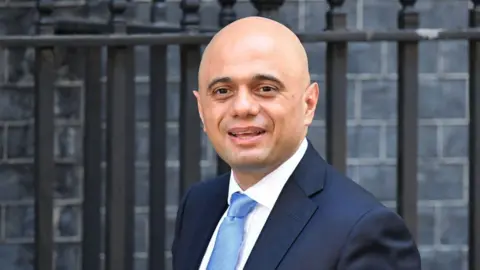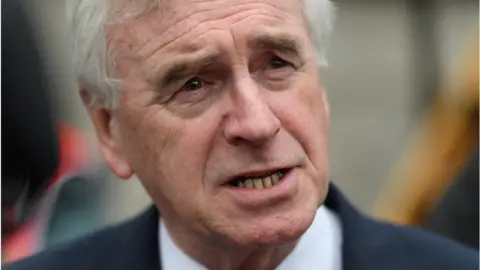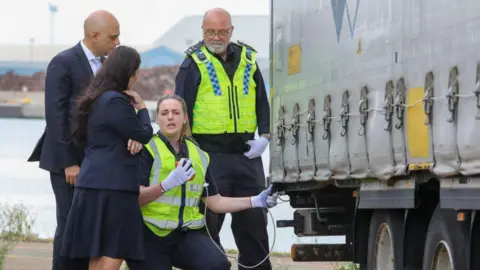Brexit: Chancellor announces one-year spending review
 Getty Images
Getty ImagesChancellor Sajid Javid has announced a one-year spending review to give government departments "financial certainty" as they prepare for Brexit.
Mr Javid said a spending round for 2020-21 would "clear the ground ahead of Brexit while delivering on people's priorities".
He told the BBC that he was confident it would meet the government's priorities for the NHS, police and schools.
It is not a multi-year spending review.
Those usually happen every two to four years and due to Brexit delays there has not been such a review since 2015.
The Institute for Fiscal Studies called it "long-awaited", while Labour said the Tories were "playing dangerous games with spending".
Spending reviews are regularly carried out by the Treasury to fix firm expenditure limits and set out what the public can expect from the government.
Mr Javid told the BBC: "One of things I've done is I want to make sure all departments, including my own, are very focused on our priority which is to make sure we leave the European Union on October 31st.
"That's why I'm having a one-year spending round so we can just get focused on our priority.
"But I'm confident that in that spending round that we'll be able to meet all our priorities and that certainly means increased focus on the NHS, on police and on schools."
Mr Javid was appointed chancellor by incoming Prime Minister Boris Johnson last month, replacing Philip Hammond.
Speaking after data showed the economy had contracted in the second quarter of the year, he added: "I'll be a chancellor to make sure that our country continues to live within our means."
He also said the economy remained strong and was forecast to return to growth, meaning the government could "continue to invest in the priorities of the British people".
Chief Secretary to the Treasury Rishi Sunak said: "This spending round will give financial certainty to departments' plans for next year.
"We will invest in the priority areas of schools and policing, while delivering our promises on the NHS, defence and Official Development Assistance [foreign aid]."
 Getty Images
Getty ImagesUnder Mr Johnson's administration, emergency preparations for a possible no-deal Brexit have been ramped up.
Last week, Mr Javid announced an extra £2.1bn of funding to prepare for such an outcome - doubling the amount of money the government has set aside this year.
'Gaping holes'
Labour's Mr McDonnell said the approach "smacks of pre-election panic measures by the government".
"Boris Johnson is splashing a little bit of cash as a publicity stunt, but keeping the door open for even more austerity if a no-deal Brexit breaks the economy," he said.
Mr McDonnell said there were "gaping holes" in the spending plans, with "nowhere near enough" allocated to the NHS, schools or local government.
About 50% of government spending is planned on a multi-year basis, when it comes to things like public services, such as the NHS, schools or the police, which are unlikely to alter drastically from year to year.
Typically, these budgets are set three or four years in advance, in order to help government departments plan their spending more effectively.

Analysis
Tony Bonsignore, political correspondent
Government departments are likely to have mixed views about this announcement.
On the one hand, some public services - for example, health and the police - may be offered more money. There may also be extra cash to deal with the potential fallout from a no-deal Brexit.
The government says this decision is about getting Brexit done and delivering on people's priorities.
But the decision also makes it harder for public services to plan for the longer term, as they'll now have to wait another year for the real spending review.
There's also the risk that the spending taps might be turned off as quickly as they're turned on. That's Labour's line of attack - they're accusing the government of playing "dangerous games" and "abandoning any pretence of a long-term economic plan".

"If you're a head teacher or head of a police force, if you're trying to work out who to hire or whether to invest in a piece of equipment, it helps to know what your budget is going to be into the future," Ben Zaranko, a research economist with the Institute for Fiscal Studies, told the BBC.
"If you have to plan this on a year-to-year basis, it's quite hard."
This time, the spending review will be published in advance of the Budget, which means the chancellor will be making spending plans before he has updated forecasts for the economy, and before he has set tax policy, Mr Zaranko added.
One-year spending reviews are not unprecedented. In 2013, the government set the budget for 2015-16, so as to avoid spending decisions going beyond the next election.
 WPA Pool
WPA PoolThe IFS's Mr Zaranko said it made sense that the chancellor was unwilling to commit to longer spending plans, because "we don't know what the economy is going to look like six months down the line, let alone three years".
However, it would make it much harder for government departments to plan for the future.
Earlier this year, Her Majesty's Chief Inspector of Constabulary released a report warning that one-year spending reviews would not be good for the police in England.
But James Jamieson, chairman of the Local Government Association, welcomed the one-year spending round, saying councils "urgently need some certainty about how local services will be funded next year as they begin their budget-setting process".
